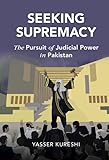Seeking supremacy : the pursuit of judicial power in Pakistan / Yasser Kureshi, University of Oxford.
Series: Cambridge studies in law and societyPublisher: Cambridge, United Kingdom ; New York, NY : Cambridge University Press, 2022Description: xii, 286 pages 22 cmContent type:- text
- unmediated
- volume
- 9781316516935
- 347.5491014 23/eng/20220207
| Item type | Current library | Shelving location | Call number | Status | Notes | Date due | Barcode |
|---|---|---|---|---|---|---|---|
 BOOKs
BOOKs
|
National Law School | General Stacks | 347.5491014 KUR - 1 (Browse shelf(Opens below)) | Available | Recommended by Prof. Dr. Arun Thiruvengadam | 39256 | |
 BOOKs
BOOKs
|
National Law School | General Stacks | 347.5491014 KUR - 2 (Browse shelf(Opens below)) | Available | Recommended by Prof. Dr. Arun Thiruvengadam | 39261 |
Browsing National Law School shelves, Shelving location: General Stacks Close shelf browser (Hides shelf browser)

|

|

|

|

|

|

|
||
| 347.54077 CHA-1 Jai Bhim : | 347.54077 CHA-2 Jai Bhim : | 347.5491014 KUR - 1 Seeking supremacy : the pursuit of judicial power in Pakistan / | 347.5491014 KUR - 2 Seeking supremacy : the pursuit of judicial power in Pakistan / | 347.6035 FOM Constitutional Adjudication in Africa / | 347.68035 ROU The politics of principle : the first South African Constitutional Court, 1995-2005 / | 347.71 MCL Truth be told: The story of my life and my fight for equality / |
Based on author's thesis (doctoral - Brandeis University, 2018) issued under title: Judging the generals : judicial-military interactions in authoritarian and post-authoritarian states.
Includes bibliographical references and index.
Introduction -- Judiciary, rule of law and the military -- The Loyal Court (1947-1977) -- The Controlled Court (1977-1999: Part 1) -- Between the barracks and the bar (1977-1999: Part 2) -- The Confrontational Court (1999-2017) -- Epilogue : a judiciary fragmenting? -- Conclusion and comparative perspectives.
"Like many other post-colonial states, Pakistan's political system has experienced domination by its military and other political power centres have needed to define their roles vis-à-vis the armed forces. An especially significant institution, and one whose role vis-à-vis the miltary has evolved and changed over time, has been the higher judiciary. On November 3rd, 2007, General Musharraf, Pakistan's fourth military ruler (since 1999), proclaimed a state of emergency in the country and suspended Pakistan's constitution. Musharraf's Proclamation was motivated by a growing confrontation with Pakistan's judiciary and its activist twentieth Chief Justice, Iftikhar Chaudhry. The regime ordered the judges of the High Courts and the Supreme Court to take an oath to uphold his new Provisional Constitutional Order, and dismiss any legal challenge to the powers and authority of Musharraf's military regime. Any judges who refused to take this oath were to be immediately removed from judicial service. Yet, in an impressive show of defiance, a majority of the judges refused to take the oath, and suffered removal from office. A picture of Justice Chaudhry being manhandled by security officials soon became an iconic image that galvanized public support for the judiciary in its growing confrontation with the military. As the confrontation between the two institutions escalated, Pakistan's lawyers mobilized across the country, celebrating the judiciary's newfound commitment to socio-economic activism, encouraging its growing assertiveness against the military regime, and resisting efforts by the military to subdue the judiciary"-- Provided by publisher.

There are no comments on this title.